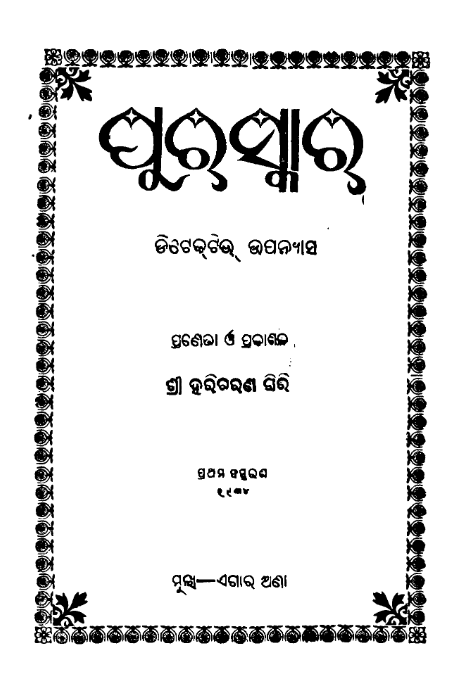Puraskara, a notable Odia novel written by Hari Charana Giri and published in 1934, stands as a cornerstone in Odia literature. Renowned for its nuanced storytelling and deep exploration of human relationships, the novel effectively captures the socio-cultural dynamics of its time while addressing universal themes that resonate across generations.
Puraskara, which translates to Award or Reward, delves into the life of its protagonist, a young and ambitious individual navigating the complexities of love, family, and societal expectations. The narrative is set against the backdrop of colonial India, a period marked by social change and awakening. Giri’s protagonist finds himself at the crossroads of tradition and modernity, compelled to make choices that would not only determine his future but also impact the lives of those around him.
As the story unfolds, Giri intricately weaves a tapestry of relationships—friendships that blossom, romantic entanglements that complicate, and familial ties that demand loyalty. The protagonist’s journey is one of self-discovery, laden with the weight of dreams and the harsh realities of life. Through various trials and tribulations, he grapples with the concepts of success, moral integrity, and personal sacrifice, culminating in a poignant exploration of what it truly means to earn a “puraskara” in life.
One of the most striking aspects of Puraskara is its vivid character development. Giri breathes life into his characters, making them relatable and multifaceted. The protagonist embodies the aspirations of a youth yearning for success, while supporting characters—friends, mentors, and family members—serve as reflections of different societal roles. Each character is intricately crafted, representing various facets of life and contributing to the overarching themes of the novel.
The author’s attention to detail helps readers form a connection with the characters, immersing them in their joys and struggles. From the passionate love affairs to the disappointments and triumphs, every emotion is palpable, inviting readers to experience the journey alongside the protagonist.
Beyond its engaging narrative, Puraskara serves as an astute commentary on the social issues of its time. Giri does not shy away from addressing the challenges faced by the youth in a rapidly changing society. Themes such as the clash between traditional values and modern aspirations, the impact of colonial rule on individual lives, and the significance of personal ethics in the quest for success are woven seamlessly into the storyline. The novel incites reflection on the nature of rewards and the sacrifices often required to achieve one’s goals.
Puraskara has left an indelible mark on Odia literature, inspiring subsequent generations of writers and readers alike. Its exploration of timeless themes continues to resonate in contemporary society, proving that the questions of identity, ambition, and morality are as relevant today as they were in the early 20th century.
Books Info
| Books name | Puraskara / ପୁରସ୍କାର |
| Author | Hari Charana Giri |
| No Of pages | 173 |
| Publisher | Sri Harihar Giri |
| Publication | 1934 |
| Printed At | NA |
| Distributor | NA |

